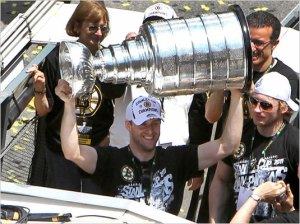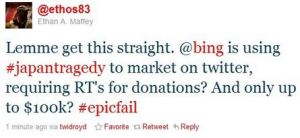Growing up – I was (and still am) an avid sports enthusiast. I played both baseball and basketball for as long as my mediocre athleticism would allow me to. Even today, one of my favorite hobbies is to head over to an outdoor court on a nice summer night and play pick-up basketball with people I have never met before. It’s my primary form of relaxation. As a resident of Boston, MA – (The greatest sports city in the world) – I have also always been a rabid fan of all of my local teams. Through the highs and lows, I remain, although not always happy, loyal to my teams. This passion for sports is something that defines me.
Another thing that has always defined me is an intense competitive nature. In sports and in all other elements of my life, I am fiercely competitive. And it has been a blessing as well as a curse. On the one hand, it has caused me to seek success, to strive to be the best at everything that I do. On the other hand, however, it has made me an admitted sore loser. I was the kid who refused to shake hands after losing a little league game (In fact, I once got suspended in little league for throwing all of my equipment into the woods after a loss – yes, true story). I HATE losing, and I hate when my teams lose.

Which finally brings me to my point. My mother always used to say to me, “It’s just a game, there’s no reason to get so upset about it.” And in reference to my outlandish reaction to losing, she was right. But I disagree with her on the former part of her statement. Because a professional sport isn’t JUST a game. Let me tell you why:
The impetus for this post comes from the Boston Bruins victory last week in the Stanley Cup Final – bringing home the championship to Boston for the first time in 39 long years. On Saturday, I had the pleasure of walking around the city during the Championship Parade, and what I saw was truly awesome. There were twenty somethings that filled the bars enjoying some much deserved (and non-violent) day-drinking with friends. There were young families introducing their children to the wonder of sports and teamwork. And there were older fans, who vividly remembered the Bruins’ last victory in ’72, and were filled with pure happiness to see them win it again in their lifetime. People from all walks of life became family for just one day, sharing hugs and high-fives with total strangers. I even met a homeless man, sitting outside a Dunkin Donuts – with a smile from ear to ear as he talked about how he was going to head over and try to see the parade (He was also the beneficiary of the good mood everyone was in when they passed by his cup).
Perhaps my view of the world of professional sports is tainted by the market I live in. The passion a big market has for its sports teams is very different than other markets. (New York, Boston, Philadelphia, LA, Chicago, Dallas, etc. being ‘Big Market’) However, until last week, one could make the argument that the Bruins did not have a ‘big market’ fan base in this city. So the principal is the same. For this city, during this celebration, the Boston Bruins tore down social barriers. There were no racial or age differences, no socio-economic stati, there was just pure elation. A sport is one of those rare entities that has the power to bring together entire communities, it’s an escape from reality, and it’s an opportunity to bond with those who matter (and those who don’t, too!) In short, a sport is not JUST a game, it’s much more. Congratulations to the 2010-2011 Boston Bruins, thanks for making the city of Boston come alive again!


